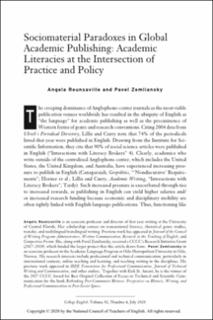| dc.description.abstract | The creeping dominance of Anglophone-center journals as the most viable publication venues worldwide has resulted in the ubiquity of English as “the language” for academic publishing as well as the preeminence of Western forms of genre and research conventions. Citing 2004 data from Ulrich’s Periodical Directory, Lillis and Curry note that 74% of the periodicals listed that year were published in English. Drawing from the Institute for Scientific Information, they cite that 90% of social science articles were published in English (“Interactions with Literacy Brokers” 4). Clearly, academics who write outside of the centralized Anglophone center, which includes the United States, the United Kingdom, and Australia, have experienced increasing pressure to publish in English (Canagarajah, Geopolitics, “‘Nondiscursive’ Requirements”; Horner et al.; Lillis and Curry, Academic Writing, “Interactions with Literacy Brokers”; Tardy). Such increased pressure is exacerbated through ties to increased rewards, as publishing in English can yield higher salaries and/or increased research funding because economic and disciplinary mobility are often tightly linked with English language publications. Thus, functioning like an economy of English, this “academic marketplace” (Lillis and Curry, Academic Writing 1) of “academic capitalism” (Slaughter and Leslie), privileges an Anglophone center over multilingual peripheries as scholars perform the ongoing intellectual work of literacy brokers to succeed (Lillis and Curry, “Interactions with Literacy Brokers” 5). These sets of conditions have implications for both the particular topic of Anglophone publishing regimes as well as the changing nature of academic literacy in the churn of globalization. In this article, we turn to Ukraine as an exemplar case for how literacy is changing for research writers in what we are terming global “edge” countries who are driven to join the Anglophone publishing center. This drive is sometimes personal but more often political and economic as writers’ livelihoods are tethered to the outcomes of publishing in English, and research universities’ funding is tied to large-scale output in pre-defined Anglophone publication venues. We define “edge” countries as those operating within a transitional, liminal, and often contradictory set of regulations, expectations, and norms around (a) the local use and politics of mono and multilingualism and the increasing ubiquity of an expectation of English fluency for job candidates in the workforce; (b) educational mandates that seek to drive a local knowledge economy to an Anglophone center; (c) de facto if not de jure participation in larger economic and political entities such as the EU or other forms of regional, Anglophone consolidation; and (d) internal economic volatility that delimits a writer’s even access to literacy’s social practices and technical skills. | en_US |
